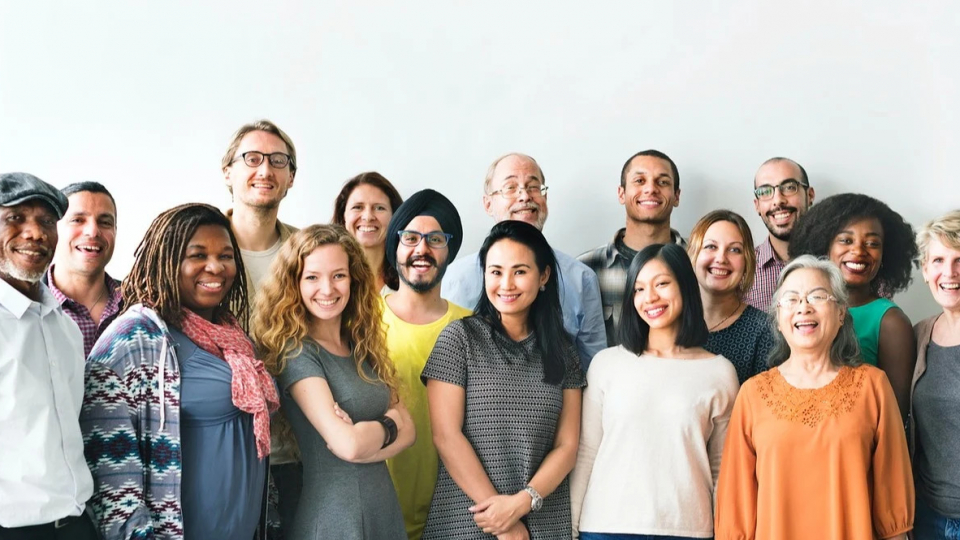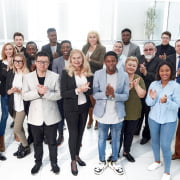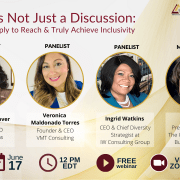Diversity is Not Just a Discussion
Over the last few years, we’ve seen many companies start to take diversity and inclusion in the workplace more seriously. Of course, we all know why these values are so important to address and implement in the workforce — but why is the focus so crucial now more than ever?
With the power of the internet to make knowledge more widely available and the ability to view mass media from all over the world, people are starting to see through companies who “talk” a lot, but don’t necessarily “walk the talk.” On June 17, 2021, Dover Staffing hosted a webinar to explore this topic by taking a deep dive into the priorities, opportunities, and challenges that diversity creates for the workplace.
To facilitate this timely conversation, we heard from our host, Sanquinetta Dover, Founder and CEO of DoverSolutions; panelist Ingrid Watkins, CEO and Chief Diversity Strategist at IW Consulting Group; panelist Veronica Maldonado Torres, President and CEO of the Georgia Hispanic Chamber of Commerce; panelist Adam Moore, VP, Director of Supplier Diversity for Truist Bank; and moderator Roz Lewis, President and CEO at The Greater Women’s Business Council.
How can diversity give companies a competitive advantage?
More and more companies are seeing how diversity drives better results and more purpose-driven employees. Companies must understand that being intentional with hearing from different employee perspectives is crucial to creating game changing products and services. Seeing through the lens of diversity creates a sustainable, growing enterprise and is instrumental in talent search as well.
Diversity and inclusion are also key in branding in today’s day and age. We are learning that younger generations are not brand loyal like their parents are or once were. Young people today are more driven to purchase from companies with a strong Diversity, Equity & Inclusion (DE&I) and Corporate Social Responsibility (CSR) presence, and the power of social media matters a lot to them. Adam stressed that DE&I “can’t just be a banner or flag on the wall.” A company winning in diversity and inclusion is a company that is winning in authenticity.
What should organizations do to leverage the power of diversity in their workforce?
The first step is to create a culture of diversity. Having different viewpoints and diverse people at the decision-making table is critical for an organization. For example, noted Veronica, steps should include “creating business resource groups and places of education for the non-diverse groups of the organization to get to know each other and learn.” Education for everyone in the organization is a crucial part of building that culture.
When we talk about diversity and inclusion within the workforce, which groups are we including?
Roz shared how the pandemic gave everyone, individuals and companies alike, time to sit back and think about their current state and how they can improve. Companies must think about how they create spaces within their structure for everyone, and how they are measuring success. Victoria also touched on the topics of neurodiversity and disability, and how companies have been and should start to think about incorporating neurodiverse and differently abled employees into their culture. She challenges companies to think about how they can “win together” by empowering their employees with resources to succeed — which also results in more success for the business.
Socioeconomics adds an additional level of complexity to efforts to create equity, as its impact is not always visible or known at various stages of the employee journey, such as the application process. Over the pandemic, disparities between wealthier and lower income consumers increased. As a result, employers have a renewed and heightened responsibility to think about equity and how they ensure access to essentials like personal development opportunities and promotions are within everyone’s reach.
How can we change our recruiting and talent development processes to better attract and engage diverse individuals?
“In order to identify diverse talent,” stated Ingrid, “you have to go where they are.” This can mean reaching out to various cultural associations to find talent as well as building relationships with organizations like Historically Black Colleges and Universities (HBCUs). Diversity should be as much a corporate strategy as marketing, sales, and business development are. When diversity is not a top priority, it is destined to fail. Implementing practices such as goals to measure success and compliance checklists are a great way to ensure progress.
What do we mean by diversity, equity, and inclusion?
Employers tend to focus on these terms when it comes to hiring, but truly adopting the principles of DE&I means so much more. Equality is about treating everyone the same, whereas equity is focused on making sure everyone is treated fairly by taking into account their privilege or lack thereof. It is important for companies to ensure that their pay scale and policies for how they assess, grade, and pay employees is fair. It’s all about equal footing.
What are two steps employers can take to build a diverse, equal, and inclusive workforce and culture?
When employers put together a talent strategy, they should focus on eliminating bias throughout the employee life cycle, i.e. recruiting, interviewing, hiring process, belonging, and development. This attentiveness should occur over the course of the professional’s career with the company as well. The first step towards creating a true diverse and inclusive environment is committing to action.
The Dover philosophy takes a human-focused, global approach to problem solving by creating business solutions that enhance the modern workplace. Together, DoverSolutions, DoverStaffing, and the Dover Training Institute are able to address workforce development challenges on multiple levels. To find talent, click here, fill out your information, and one of our recruitment specialists will be in touch. To find a career, click here to see available positions in Atlanta.









